This Week in Freethought History (June 30-July 6)
Here’s your week in Freethought History. This is more than just a calendar of events or mini-biographies – it’s a reminder that, no matter how isolated and alone we may feel at times, we as freethinkers are neither unique nor alone in the world.
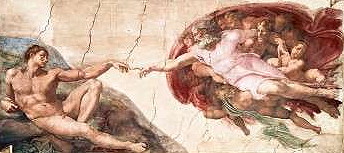 Last Sunday, June 30, but in 1909, the Pontifical Biblical Commission, which had been formed by Leo XIII (Pope 1878-1903) seven years earlier, decreed that the first 11 chapters of the biblical book of Genesis must be interpreted by Catholics as history, not as mythology. As in ages past, this meant that Catholics were compelled to accept as genuine history the childish and derivative stories of the Creation, the Garden of Eden, the Fall, the Flood, and the confusion of languages at Babel. In the creation, the earth is formed before light and stars, birds and whales before reptiles and insects, and flowering plants before animals. Science tells us the true order of events was just the opposite. The flood covered the highest mountains, but there is no explanation of where the water came from, where it went, or why there is no geological record of it. In the Babel story, humans separated into groups on the basis of their language, but historical linguists will tell you that languages evolve within groups already separated. The Pontifical Biblical Commission ratified the prescription of its founder, Leo XIII, who said, “All the books which the Church received as sacred and canonical were written wholly and entirely, with all their parts, at the dictation of the Holy Ghost. It is impossible, therefore, that any error can co-exist with divine inspiration.” So there it is!
Last Sunday, June 30, but in 1909, the Pontifical Biblical Commission, which had been formed by Leo XIII (Pope 1878-1903) seven years earlier, decreed that the first 11 chapters of the biblical book of Genesis must be interpreted by Catholics as history, not as mythology. As in ages past, this meant that Catholics were compelled to accept as genuine history the childish and derivative stories of the Creation, the Garden of Eden, the Fall, the Flood, and the confusion of languages at Babel. In the creation, the earth is formed before light and stars, birds and whales before reptiles and insects, and flowering plants before animals. Science tells us the true order of events was just the opposite. The flood covered the highest mountains, but there is no explanation of where the water came from, where it went, or why there is no geological record of it. In the Babel story, humans separated into groups on the basis of their language, but historical linguists will tell you that languages evolve within groups already separated. The Pontifical Biblical Commission ratified the prescription of its founder, Leo XIII, who said, “All the books which the Church received as sacred and canonical were written wholly and entirely, with all their parts, at the dictation of the Holy Ghost. It is impossible, therefore, that any error can co-exist with divine inspiration.” So there it is!
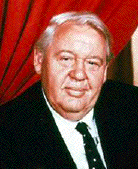 Last Monday, July 1, but in 1899, English-American actor Charles Laughton was born. Although Laughton’s interest in men as sexual partners was predominant, he and Elsa Lanchester became life-long companions. They married in a civil ceremony in 1929. Throughout a distinguished career, Laughton performed in 41 plays and 55 films. Most memorable were his performance as Captain Bligh in Mutiny on the Bounty (1935); the title role in 1933’s Private Life of Henry VIII, for which he won a Best Actor Oscar; a poignant Quasimodo in The Hunchback of Notre Dame (1939); and as eccentric lawyer in Witness for the Prosecution (1957). Biographer Simon Callow says Laughton’s brothers invited a procession of priests to attend the dying man, as he lay drugged and gasping for air. Laughton mused, “I wish they were more intelligent.” His wife opposed any attempt to trick him “into endorsing something he had vehemently denounced all his adult life.” But during one of her infrequent absences, a priest was rushed in to administer extreme unction. Unable to protest, the lapsed Catholic murmured, “I think I’ve joined the gang.”
Last Monday, July 1, but in 1899, English-American actor Charles Laughton was born. Although Laughton’s interest in men as sexual partners was predominant, he and Elsa Lanchester became life-long companions. They married in a civil ceremony in 1929. Throughout a distinguished career, Laughton performed in 41 plays and 55 films. Most memorable were his performance as Captain Bligh in Mutiny on the Bounty (1935); the title role in 1933’s Private Life of Henry VIII, for which he won a Best Actor Oscar; a poignant Quasimodo in The Hunchback of Notre Dame (1939); and as eccentric lawyer in Witness for the Prosecution (1957). Biographer Simon Callow says Laughton’s brothers invited a procession of priests to attend the dying man, as he lay drugged and gasping for air. Laughton mused, “I wish they were more intelligent.” His wife opposed any attempt to trick him “into endorsing something he had vehemently denounced all his adult life.” But during one of her infrequent absences, a priest was rushed in to administer extreme unction. Unable to protest, the lapsed Catholic murmured, “I think I’ve joined the gang.”
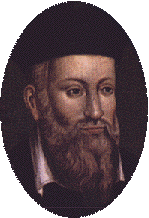 Last Tuesday, July 2, but in 1566, the supposed prophet of the Middle Ages, Nostradamus, died – as he predicted. His career, as mystic, doctor, astrologer, apothecary, and writer, was that of a Freethinker, although he died a Catholic. He was born, on 14 December 1503, the son of Jewish parents compelled by the Inquisition to adopt Christianity. His prophecies, published in 1550, are claimed to have predicted everything from Louis Pasteur and his germ theory of disease, Hitler, the explosion of the space shuttle Challenger and the attack on the World Trade Center and Pentagon by Islamic terrorists. And why not? Nostradamus used a technique that prophets and astrologers use to this day: ambiguous specificity. Many writers assert that his prophecies made Nostradamus famous in his lifetime, but of course its “ambiguous specificity” made each prophecy meaningless until after the event – at which time the events were fit to the prophecy!
Last Tuesday, July 2, but in 1566, the supposed prophet of the Middle Ages, Nostradamus, died – as he predicted. His career, as mystic, doctor, astrologer, apothecary, and writer, was that of a Freethinker, although he died a Catholic. He was born, on 14 December 1503, the son of Jewish parents compelled by the Inquisition to adopt Christianity. His prophecies, published in 1550, are claimed to have predicted everything from Louis Pasteur and his germ theory of disease, Hitler, the explosion of the space shuttle Challenger and the attack on the World Trade Center and Pentagon by Islamic terrorists. And why not? Nostradamus used a technique that prophets and astrologers use to this day: ambiguous specificity. Many writers assert that his prophecies made Nostradamus famous in his lifetime, but of course its “ambiguous specificity” made each prophecy meaningless until after the event – at which time the events were fit to the prophecy!
 Last Wednesday, July 3, but in 1947, Pulitzer Prize-winning American author and columnist Dave Barry was born. The son of a minister and an alumnus of a Quaker-affiliated college, Barry avoided military service in the Vietnam War as a conscientious objector claiming religious principles. He began his career as a reporter and worked his way to humor columnist for the Miami Herald in 1983. Barry won a Pulitzer Prize for Commentary in 1988. He continued his Miami Herald column until October 2004. Taking material from Dave Barry's Greatest Hits (1988) and Dave Barry Turns 40 (1990), from 1993-1997, CBS-TV broadcast the sitcom “Dave’s World.” In spite of a religious upbringing, “I liked making people laugh, and I decided I was an atheist early on,” he says in a Fort Worth Star-Telegram interview (11/25/2001). “My Dad was all right with that. We argued about it all the time, but it was good-natured. He was the most open-minded human being I’ve ever known.” “The problem with writing about religion,” says Barry, in Jack Huberman’s Quotable Atheist (2007), “is that you run the risk of offending sincerely religious people, and then they come after you with machetes.”
Last Wednesday, July 3, but in 1947, Pulitzer Prize-winning American author and columnist Dave Barry was born. The son of a minister and an alumnus of a Quaker-affiliated college, Barry avoided military service in the Vietnam War as a conscientious objector claiming religious principles. He began his career as a reporter and worked his way to humor columnist for the Miami Herald in 1983. Barry won a Pulitzer Prize for Commentary in 1988. He continued his Miami Herald column until October 2004. Taking material from Dave Barry's Greatest Hits (1988) and Dave Barry Turns 40 (1990), from 1993-1997, CBS-TV broadcast the sitcom “Dave’s World.” In spite of a religious upbringing, “I liked making people laugh, and I decided I was an atheist early on,” he says in a Fort Worth Star-Telegram interview (11/25/2001). “My Dad was all right with that. We argued about it all the time, but it was good-natured. He was the most open-minded human being I’ve ever known.” “The problem with writing about religion,” says Barry, in Jack Huberman’s Quotable Atheist (2007), “is that you run the risk of offending sincerely religious people, and then they come after you with machetes.”
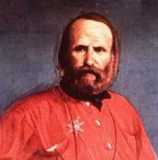 Last Thursday, July 4, but in 1807, Italian-born liberator Giuseppe Garibaldi was born. His Italian Republican leanings were encouraged by his association with Giuseppe Mazzini (1805-1872) and after many attempts, Garibaldi finally won a unified Italy for Victor Emanuel. He was rewarded with a seat in the Italian Parliament. In 1861 President Lincoln offered Garibaldi a command in the Union Army during the Civil War, but a Vatican protest forced Lincoln to withdraw the offer. Mazzini seemed disappointed in Garibaldi’s frank Atheism and scorn for the Church, as if he had not seen the clerical opposition that almost stymied Italian nationhood. In a letter Garibaldi wrote two years before his death, on 2 June 1882, and bluntly said, “Dear friends – Man created God, not God Man. Yours ever, Garibaldi.”
Last Thursday, July 4, but in 1807, Italian-born liberator Giuseppe Garibaldi was born. His Italian Republican leanings were encouraged by his association with Giuseppe Mazzini (1805-1872) and after many attempts, Garibaldi finally won a unified Italy for Victor Emanuel. He was rewarded with a seat in the Italian Parliament. In 1861 President Lincoln offered Garibaldi a command in the Union Army during the Civil War, but a Vatican protest forced Lincoln to withdraw the offer. Mazzini seemed disappointed in Garibaldi’s frank Atheism and scorn for the Church, as if he had not seen the clerical opposition that almost stymied Italian nationhood. In a letter Garibaldi wrote two years before his death, on 2 June 1882, and bluntly said, “Dear friends – Man created God, not God Man. Yours ever, Garibaldi.”
 Yesterday, July 5, but in 1865, Methodist street preacher William Booth founded the Salvation Army. Booth’s mission adopted the name “Salvation Army” in 1878 and also adopted a quasi-military vocabulary and hierarchy. Booth’s concept of saving souls while saving bodies caught on well and anticipated many government-run charities throughout the 20th century. What could be wrong with that? Allowing the Army to use tax dollars for their work against hunger, homelessness, poverty and abuse, without disallowing their Christian proselytizing, is manifestly a violation of church-state separation. In effect, taxpayers are subsidizing employment discrimination and Christian preachers, allowing government meddling in religion, de-funding voluntary religious charities, playing favorites (or at least deciding which religions are legitimate and which are not), and funding a charitable choice that is demonstrably less efficient at delivering social services than the federal government itself.
Yesterday, July 5, but in 1865, Methodist street preacher William Booth founded the Salvation Army. Booth’s mission adopted the name “Salvation Army” in 1878 and also adopted a quasi-military vocabulary and hierarchy. Booth’s concept of saving souls while saving bodies caught on well and anticipated many government-run charities throughout the 20th century. What could be wrong with that? Allowing the Army to use tax dollars for their work against hunger, homelessness, poverty and abuse, without disallowing their Christian proselytizing, is manifestly a violation of church-state separation. In effect, taxpayers are subsidizing employment discrimination and Christian preachers, allowing government meddling in religion, de-funding voluntary religious charities, playing favorites (or at least deciding which religions are legitimate and which are not), and funding a charitable choice that is demonstrably less efficient at delivering social services than the federal government itself.
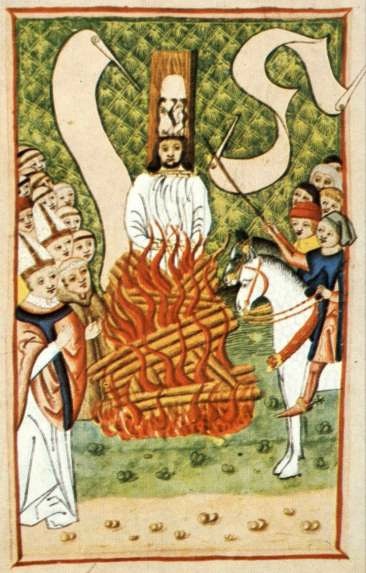 Today, July 6, but in 1415, the leader of a much-needed reform movement within the Roman Catholic Church, Jan Hus, was burned at the stake for heresy. It is said that Hus’s doctrinal divergences from Church teaching were socially harmful, but that is laughable given the corruption against which he and John Wyclif (who had died in 1384) had been protesting. Even though Hus had been excommunicated in 1410, he decided to defend his views before the Council of Constance, in what is now Germany, under a guarantee of safe passage from Emperor Sigismund. Unsurprisingly, his “safe conduct” was a ruse: once at Constance, he was arrested, tried, and condemned. His followers, knows as Hussites, still pushed for reform – and were persecuted and slaughtered by the Church.
Today, July 6, but in 1415, the leader of a much-needed reform movement within the Roman Catholic Church, Jan Hus, was burned at the stake for heresy. It is said that Hus’s doctrinal divergences from Church teaching were socially harmful, but that is laughable given the corruption against which he and John Wyclif (who had died in 1384) had been protesting. Even though Hus had been excommunicated in 1410, he decided to defend his views before the Council of Constance, in what is now Germany, under a guarantee of safe passage from Emperor Sigismund. Unsurprisingly, his “safe conduct” was a ruse: once at Constance, he was arrested, tried, and condemned. His followers, knows as Hussites, still pushed for reform – and were persecuted and slaughtered by the Church.
Other birthdays and events this week—
July 1: French Romantic novelist George Sand was born (1804).
July 5: English philosopher and philanthropist Samuel Bailey was born (1791).
We can look back, but the Golden Age of Freethought is now. You can find full versions of these pages in Freethought history at the links in my blog, FreethoughtAlmanac.com.

